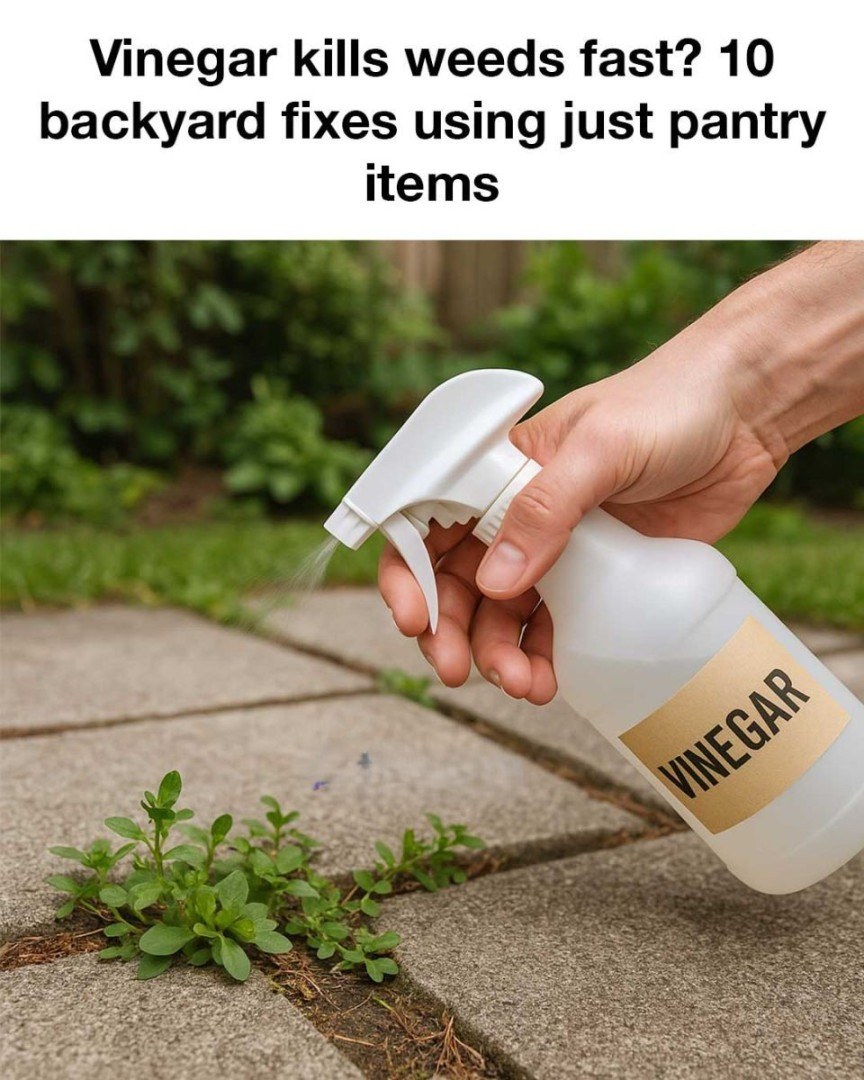In the quest for a beautiful backyard, many homeowners turn to chemical solutions to tackle common gardening problems. However, these products can be harmful to the environment and potentially dangerous for pets and children. Fortunately, effective alternatives can be found right in your kitchen.
By using everyday household items, you can maintain a lush, healthy garden without resorting to harsh chemicals. From vinegar to olive oil, these pantry staples offer a range of solutions for common backyard issues. Whether you’re dealing with weeds, pests, or soil enrichment, these natural remedies are not only cost-effective but also eco-friendly.
1. Vinegar: The Natural Weed Killer
Vinegar is a powerful and natural weed killer due to its high acidity. The acetic acid in vinegar draws moisture from weeds, causing them to dry out and die. Use white vinegar with at least 5% acetic acid for best results.
Simply fill a spray bottle with undiluted vinegar and spray it directly on the leaves of weeds on a sunny day—the heat amplifies the vinegar’s effect.
➡️ For stubborn weeds, add 1 tablespoon of dish soap to the mix. This helps the vinegar stick to the leaves for better absorption.
⚠️ Vinegar is non-selective, so be careful not to spray nearby plants you want to keep.
2. Baking Soda for Ant Control
Baking soda is a simple, effective way to get rid of ants. It interferes with their digestive system and damages their exoskeletons.
Mix equal parts baking soda and powdered sugar. The sugar attracts the ants, and the baking soda eliminates them.
Sprinkle the mixture along ant trails and around entry points. Reapply after rain or watering for best results.
3. Salt as a Weed Barrier
Salt dehydrates plants and prevents nutrient absorption, making it an effective weed preventer.
Mix 1 cup of salt with 2 cups of hot water, and pour it over areas where you want to stop weed growth (like driveways or cracks in pavement).
⚠️ Avoid using salt near your garden plants—it can ruin the soil for future growth.
4. Used Coffee Grounds to Enrich Soil
Coffee grounds are rich in nitrogen, which promotes healthy plant growth.
Sprinkle them around your garden or mix them into compost to improve soil structure and attract earthworms. They also deter pests like slugs and snails.
💡 Avoid using too much, as it can acidify your soil.
5. Dish Soap Spray for Aphid Control
Dish soap breaks down aphids’ protective layers, causing them to dehydrate.
Mix 1 tablespoon of mild dish soap with 1 quart of water and spray directly on affected plants.
Repeat every few days until aphids disappear. Avoid soaps with added dyes or fragrances.
6. Cornmeal to Prevent Weeds
Cornmeal acts as a pre-emergent herbicide, preventing seeds from germinating.
Sprinkle a thin layer on your soil in early spring before weeds emerge.
It’s safe for pets and kids, and won’t harm existing plants or beneficial insects.
7. Epsom Salt for Plant Growth
Epsom salt contains magnesium and sulfur, essential for healthy plant development.
Dissolve 1 tablespoon in a gallon of water and use it to water your plants once a month.
It’s especially great for tomatoes, peppers, and roses, boosting blooms and fruiting. Don’t overuse—it may disrupt soil balance.
8. Lemon Juice to Deter Pests
The strong scent and acidity of lemon juice repel many insects.
Mix equal parts lemon juice and water in a spray bottle. Apply around garden edges, doorways, or pest-prone areas.
It’s safe for pets and plants, and can be reapplied after rain.
9. Cinnamon to Prevent Fungal Growth
see continuation on next page
ADVERTISEMENT

